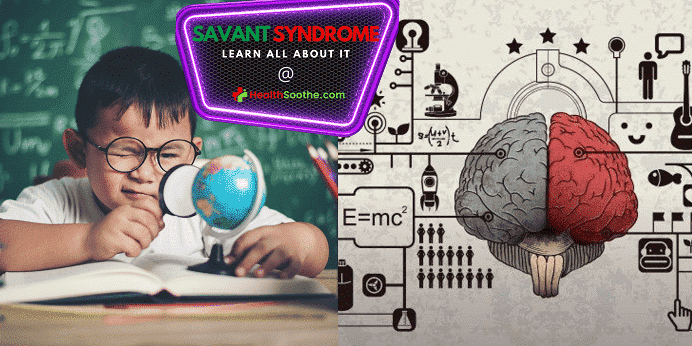Have you ever seen or observed someone or people who have various developmental disorders like autistic disorder (people with autistic disorder often have problems with social communication and interaction, and restricted or repetitive behaviors or interests), and yet still, this set of people have amazing talents and skills that you can never dream to have.
If you are hearing or seeing this for the first time, then yeah, such people exist. They might have intellectual disabilities but they are able to memorize a thousand words in under 15 minutes, play a musical instrument with such skill it can be considered otherworldly, have amazing artistic talents, and other skills like exquisite sensory discrimination in smell or touch or perfect appreciation of passing time without access to a clock face.
Like wow!!!. I know you are wondering whether such people exist. Yeah, they do. I know this is the stuff you see in Marvel movies like Superman, Flash, and others. And now, you are wondering what is the phenomenon behind this.
This is a condition known as Savant Syndrome. Have you heard of it? If you want to know the phenomenon behind why these people are able to do what they can do, then you need to know all about Savant syndrome.
This article covers all you need to know about Savant syndrome; its causes, symptoms, treatments, and prevention.
Ok, you get what I am trying to say now. Let’s move on to the main article.
Savant Syndrome – What is it?

Savant syndrome is a rare condition in which persons with various developmental disorders, including autistic disorders, have amazing abilities and talents. The condition can be congenital (genetic or inborn) or can be acquired later in childhood, or even in adults.
It is a rare condition in which someone with significant mental disabilities demonstrates certain abilities far in excess of average. The skills that savants excel at are generally related to memory. This may include rapid calculation, artistic ability, map making, or musical ability. Usually, only one exceptional skill is present.
The savant skills coexist with various neurodevelopmental conditions including autistic disorder and/or intellectual disability, or other conditions such as genetic (chromosomal) disorders, brain malformation or injury, or other diseases that occur before (prenatal) during (perinatal) or after birth (postnatal), or even later in childhood or adult life (acquired savant).
How Common is Savant Syndrome?
Approximately one in 10 persons with autistic disorder have some savant skills. In the case of intellectual and/or developmental disabilities, as well as brain injuries, savant skills occur at a rate of less than 1%. Thus, not all savants are autistic, and not all people with autism are savants.
Savant syndrome is estimated to affect around one in a million people. The condition affects more males than females, at a ratio of 6:1. The first medical account of the condition was in 1783. Among those with autism, 1 in 10 to 1 in 200 have savant syndrome to some degree.
It is estimated that there are fewer than a hundred prodigious savants, with skills so extraordinary that they would be considered spectacular even for a non-impaired person, currently living.
Read Also:
- Dysautonomia | Learn all about Dysautonomia and its Different Types including what Postural Orthostatic Tachycardia Syndrome (POTS) is all About
- Green Nail Syndrome | Symptoms, Causes, Treatments, and Prevention
- Smith Lemli Opitz Syndrome Symptoms, Causes and More
- Overcoming Piriformis Syndrome: Exercises and Tips for Pain Relief
The Symptoms and Signs of Savant Syndrome
Savant skills are usually found in one or more of five major areas: art, memory, arithmetic, musical abilities, and spatial skills.
The most common kinds of savants are calendrical savants, “human calendars” who can calculate the day of the week for any given date with speed and accuracy, or recall personal memories from any given date. Advanced memory is the key “superpower” in savant abilities.
Approximately half of the savants are autistic; the other half often have some form of central nervous system injury or disease. It is estimated that up to 10% of those with autism have some form of savant abilities.
What is the Range of Savant Skills?
Savant skills exist over a spectrum of abilities:
- The most common savant abilities are called splinter skills. These include behaviors such as obsessive preoccupation with, and memorization of, music and sports trivia, license plate numbers, maps, historical facts, or obscure items such as vacuum cleaner motor sounds, for example.
- Talented savants are those persons in whom musical, artistic, mathematical or other special skills are more prominent and highly honed, usually within an area of single expertise, and are very conspicuous when viewed against their overall handicap.
- Prodigious savant: The term prodigious savant is reserved for those very rare persons in this already uncommon condition where the special skill or ability is so outstanding that it would be spectacular even if it were to occur in a non-handicapped person. In such a non-handicapped person the term “genius” would be applied. There are probably fewer than 75 prodigious savants living worldwide at the present time who would meet this high threshold of special skill.
- Calendrical savants: A calendrical savant (or calendar savant) is someone who – despite having an intellectual disability – can name the day of the week of a date, or vice versa, on a limited range of decades or certain millennia. The rarity of human calendar calculators is possibly due to the lack of motivation to develop such skills among the general population, although mathematicians have developed formulas that allow them to obtain similar skills. Calendrical savants, on the other hand, may not be prone to invest in socially engaging skills.
What are the Typical Savant Skills?
Typically, a particular skill occurs singularly in each person with savant syndrome. However, in some instances, multiple skills occur in the same person. Regardless of the type of skill, it is always combined with exceptional memory.
Below are the Typical Savant Skills:
- Musical Talent: Music is generally the most common savant skill – usually playing piano by ear and almost always with perfect pitch. Musical performance abilities are dominant, but outstanding composing skills have been documented as well, most often linked to performance ability, but not necessarily so. The triad of mental disability, blindness, and musical genius occurs with a curious, conspicuous frequency in reports over this past century.
- Artistic Talent: Artistic talent, usually painting or drawing, is seen next most frequently. Other forms of artistic talent can occur as well, such as sculpting. Lightning calculating or other mathematical skills, such as the ability to compute multi-digit prime numbers contrasted with the inability to perform even simple arithmetic, has often been reported.
- Calendar Calculating: Calendar calculating is curiously and conspicuously common among savants, particularly considering the rarity of that obscure skill in the general population. Beyond being able to name the day of the week that a date will occur on in any particular year, calendar calculating includes being able to name all the years in the next 100 in which Easter will fall on March 23rd, for example, or all the years in the next 20 when July 4 will fall on a Tuesday.
- Other Skills: Other skills are occasionally seen including multilingual acquisition ability or other unusual languages (polyglot) skills, exquisite sensory discrimination in smell or touch, perfect appreciation of passing time without access to a clock face, or outstanding knowledge in specific fields such as neurophysiology, statistics, history or navigation, to name a few.
What Causes Savant Syndrome? – What is the Mechanism behind Savant Syndrome?
While a number of theories have been put forth to date, no single theory can explain all savants.
Psychological Causes
No widely accepted cognitive theory explains savants’ combination of talent and deficit. It has been suggested that individuals with autism are biased toward detail-focused processing and that this cognitive style predisposes individuals either with or without autism to savant talents.
Another hypothesis is that savants hyper-systemize, thereby giving an impression of talent. Hyper-systemizing is an extreme state in the empathizing–systemizing theory that classifies people based on their skills in empathizing with others versus systemizing facts about the external world.
Also, the attention to detail of savants is a consequence of enhanced perception or sensory hypersensitivity in these unique individuals. It has also been hypothesized that some savants operate by directly accessing deep, unfiltered information that exists in all human brains that are not normally available to conscious awareness.
Neurological Causes
In some cases, savant syndrome can be induced following severe head trauma to the left anterior temporal lobe. Savant syndrome has been artificially replicated using low-frequency transcranial magnetic stimulation to temporarily disable this area of the brain.
What is the Treatment for Savant Syndrome?
Savant syndrome is not a disorder or disease, it’s a condition where extraordinary skills and memory are grafted onto a more basic brain dysfunction that arises from a developmental disability or some other form of central nervous system disease or disorder.
Conclusion
There are no objectively definitive statistics about how many people have savant skills or definitive scientific evidence on how people gained savant syndrome. The estimates range from “exceedingly rare” to one in ten people with autism having savant skills in varying degrees.
A 2009 British study of 137 parents of autistic children found that 28% believe their children met the criteria for a savant skill, defined as a skill or power “at a level that would be unusual even for ‘normal’ people”. As many as 50 cases of sudden or acquired savant syndrome have been reported.
Males with savant syndrome outnumber females by roughly 6:1 (in Finland), slightly higher than the sex ratio disparity for autism spectrum disorders of 4.3:1.
Savant syndrome is estimated to affect around one in a million people. The condition affects more males than females, at a ratio of 6:1. The first medical account of the condition was in 1783.
Among those with autism, 1 in 10 to 1 in 200 have savant syndrome to some degree. It is estimated that there are fewer than a hundred prodigious savants, with skills so extraordinary that they would be considered spectacular even for a non-impaired person, currently living.
All right, guys, that is it for now for savant syndrome. I hope Healthsoothe answered any questions you had concerning the savant syndrome.
Feel free to contact us at [email protected] if you have further questions to ask or if there’s anything you want to contribute or correct to this article.
You can always check our FAQs section below to know more about savant syndrome. And always remember that Healthsoothe is one of the best health sites out there that genuinely cares for you. So, anytime, you need trustworthy answers to any of your health-related questions, come straight to us, and we will solve your problem(s) for you.
[bwla_faq faq_topics=”frequently-asked-questions-associated-with-savant-syndrome” sbox=”1″ paginate=”1″ pag_limit=”5″ list=”1″ /]


